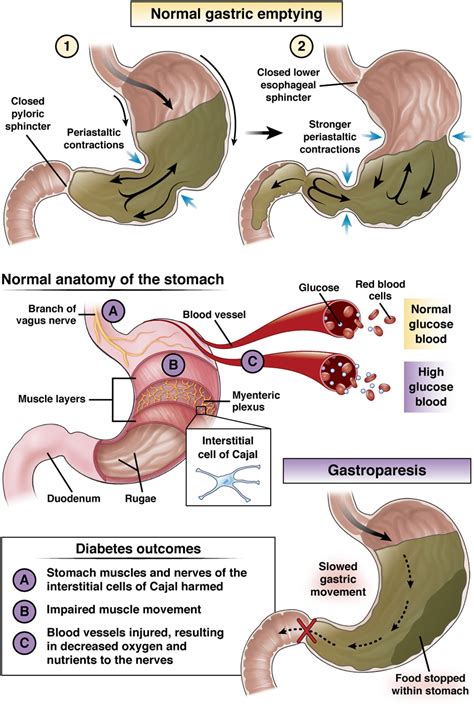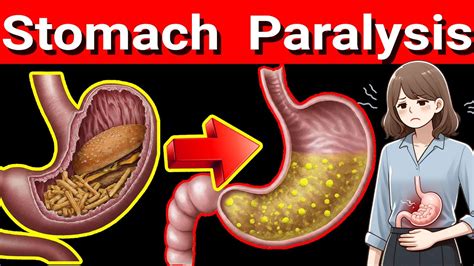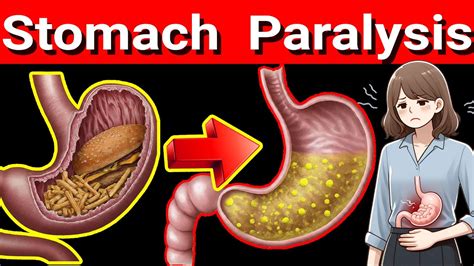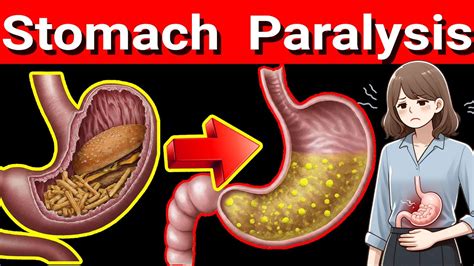Intro
Discover 5 ways stomach paralysis occurs, including gastroparesis, digestive disorders, and neurological conditions, affecting gut motility and overall health, requiring medical attention and treatment to manage symptoms.
The human digestive system is a complex and highly specialized process that involves the coordination of multiple organs and systems to break down and absorb nutrients from the food we eat. One of the key players in this process is the stomach, which uses a combination of muscular contractions and digestive enzymes to mix and break down food into a liquid mixture called chyme. However, in some cases, the stomach can become paralyzed, leading to a range of serious health problems. Stomach paralysis, also known as gastroparesis, occurs when the stomach muscles are unable to function properly, preventing the stomach from emptying its contents into the small intestine. This can lead to a range of symptoms, including nausea, vomiting, bloating, and abdominal pain. In this article, we will explore the different ways in which stomach paralysis can occur, as well as the potential causes and consequences of this condition.
Stomach paralysis is a serious medical condition that can have a significant impact on a person's quality of life. It can cause a range of symptoms, from mild discomfort to severe pain and vomiting, and can also lead to malnutrition and other complications if left untreated. There are several different ways in which stomach paralysis can occur, including diabetes, surgery, certain medications, and neurological disorders. In some cases, the exact cause of stomach paralysis may not be known, and it may be necessary to undergo a range of tests and diagnostic procedures to determine the underlying cause of the condition.
The importance of understanding the different ways in which stomach paralysis can occur cannot be overstated. By recognizing the potential causes and risk factors for this condition, individuals can take steps to reduce their risk of developing stomach paralysis, and healthcare professionals can provide more effective diagnosis and treatment. In addition, raising awareness about stomach paralysis can help to reduce the stigma and misconceptions surrounding this condition, and can encourage individuals to seek medical attention if they are experiencing symptoms. Whether you are a healthcare professional, a person living with stomach paralysis, or simply someone who is interested in learning more about this condition, this article aims to provide a comprehensive and accessible overview of the different ways in which stomach paralysis can occur.
Diabetes and Stomach Paralysis

- Damage to the nerves that control the stomach muscles
- Changes in blood sugar levels that affect the stomach muscles
- Inflammation and scarring of the stomach lining
- Imbalances in hormones and other chemicals that regulate digestion
Treatment Options for Diabetic Gastroparesis
Treatment for diabetic gastroparesis typically involves a combination of medications, dietary changes, and lifestyle modifications. Medications may include prokinetic agents, which help to stimulate the stomach muscles, as well as anti-emetic agents, which can help to control nausea and vomiting. Dietary changes may include eating smaller, more frequent meals, avoiding fatty or high-fiber foods, and choosing foods that are low in sugar and salt. Lifestyle modifications may include managing blood sugar levels, getting regular exercise, and practicing stress-reducing techniques such as meditation or deep breathing.Surgery and Stomach Paralysis

Minimizing the Risk of Stomach Paralysis after Surgery
There are several steps that can be taken to minimize the risk of stomach paralysis after surgery. These may include:- Choosing a surgeon who has experience performing the specific type of surgery
- Following a healthy diet and getting regular exercise before and after surgery
- Managing stress and anxiety through techniques such as meditation or deep breathing
- Avoiding certain medications or substances that can affect the stomach muscles
- Getting regular follow-up care and monitoring after surgery to catch any potential complications early
Certain Medications and Stomach Paralysis

- Narcotic pain medications, which can slow down the movement of food through the digestive system
- Anticholinergic medications, which can block the action of the nerves that control the stomach muscles
- Proton pump inhibitors, which can reduce the production of stomach acid and affect the movement of food through the digestive system
- Antihistamines, which can affect the nerves that control the stomach muscles and cause drowsiness and lethargy
Alternatives to Medications that Can Cause Stomach Paralysis
In some cases, it may be possible to switch to alternative medications that do not carry the same risk of stomach paralysis. For example, individuals who are taking narcotic pain medications may be able to switch to non-narcotic pain relievers, such as acetaminophen or ibuprofen. Similarly, individuals who are taking anticholinergic medications may be able to switch to alternative medications that do not have the same side effects. It is always a good idea to talk to a healthcare professional before starting or stopping any medication, as they can help to determine the best course of treatment and minimize the risk of complications.Neurological Disorders and Stomach Paralysis

Managing Stomach Paralysis in Individuals with Neurological Disorders
Managing stomach paralysis in individuals with neurological disorders can be challenging, as it often requires a comprehensive approach that takes into account the underlying condition, as well as any other health problems that may be present. This may include:- Working with a healthcare team to develop a personalized treatment plan
- Making dietary changes, such as eating smaller, more frequent meals, and avoiding fatty or high-fiber foods
- Getting regular exercise, such as walking or swimming, to help stimulate digestion and improve overall health
- Practicing stress-reducing techniques, such as meditation or deep breathing, to help manage stress and anxiety
- Considering alternative therapies, such as acupuncture or massage, to help stimulate digestion and improve overall health
Other Causes of Stomach Paralysis

- Viral infections, such as gastroenteritis
- Bacterial infections, such as food poisoning
- Inflammatory conditions, such as gastritis or pancreatitis
- Hormonal changes, such as those that occur during pregnancy or menopause
- Certain medical conditions, such as thyroid disease or scleroderma
Seeking Medical Attention for Stomach Paralysis
If you are experiencing symptoms of stomach paralysis, it is essential to seek medical attention as soon as possible. A healthcare professional can help to determine the underlying cause of the condition, and develop a personalized treatment plan to manage symptoms and improve overall health. This may include medications, dietary changes, and lifestyle modifications, as well as alternative therapies and stress-reducing techniques.What are the symptoms of stomach paralysis?
+The symptoms of stomach paralysis can include nausea, vomiting, bloating, abdominal pain, and changes in appetite or digestion.
How is stomach paralysis diagnosed?
+Stomach paralysis is typically diagnosed using a combination of medical history, physical examination, and diagnostic tests, such as endoscopy or gastric emptying studies.
Can stomach paralysis be treated?
+Yes, stomach paralysis can be treated using a combination of medications, dietary changes, and lifestyle modifications, as well as alternative therapies and stress-reducing techniques.
What are the potential complications of stomach paralysis?
+The potential complications of stomach paralysis can include malnutrition, dehydration, and electrolyte imbalances, as well as an increased risk of infections and other health problems.
How can I reduce my risk of developing stomach paralysis?
+You can reduce your risk of developing stomach paralysis by managing any underlying medical conditions, eating a healthy diet, getting regular exercise, and practicing stress-reducing techniques.
In conclusion, stomach paralysis is a serious medical condition that can have a significant impact on a person's quality of life. By understanding the different ways in which stomach paralysis can occur, individuals can take steps to reduce their risk of developing this condition, and healthcare professionals can provide more effective diagnosis and treatment. Whether you are a healthcare professional, a person living with stomach paralysis, or simply someone who is interested in learning more about this condition, we hope that this article has provided a comprehensive and accessible overview of the different ways in which stomach paralysis can occur. We encourage you to share this article with others, and to take steps to protect your digestive health. If you have any questions or comments, please do not hesitate to reach out.
